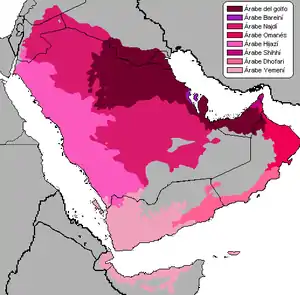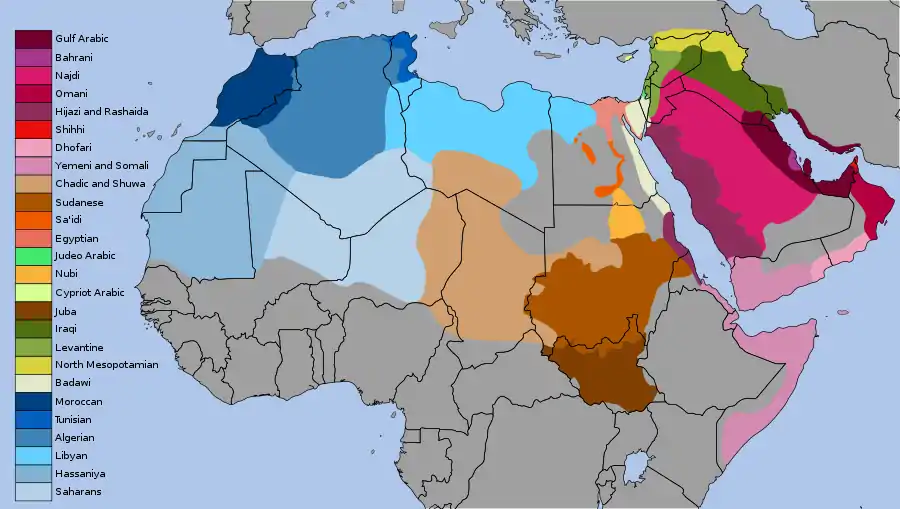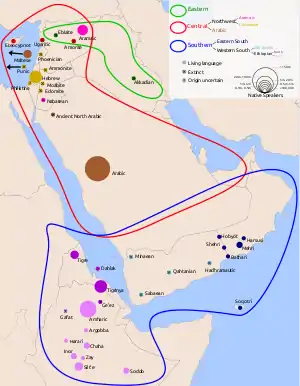Peninsular Arabic
Peninsular Arabic, or Southern Arabic, are the varieties of Arabic spoken throughout the Arabian Peninsula. This includes the countries of Saudi Arabia, Yemen, Oman, United Arab Emirates, Kuwait, Bahrain, Qatar, Southern Iraq, Southern Iran and the tribal people of Jordan (the native Jordanians).
| Peninsular Arabic | |
|---|---|
| Southern Arabic | |
| Geographic distribution | Arabian Peninsula |
| Linguistic classification | Afro-Asiatic
|
| Glottolog | arab1393 |
 | |

The modern dialects spoken in the Arabian Peninsula are closer to Classical Arabic than elsewhere.[1][2] Some of the local dialects have retained many archaic features lost in other dialects, such as the conservation of nunation for indeterminate nouns. They retain most Classical syntax and vocabulary but still have some differences from Classical Arabic like the other dialects.
Varieties

The following varieties are usually noted:
- Yemeni Arabic, displays a past conjugation with the very archaic -k suffix, as in southern Semitic languages. It has to be noted that the dialect of Aden has /ɡʲ/ > [ɡ] as in Cairo.
- Hejazi Arabic, spoken in Saudi Arabia along the coast of the Red Sea, especially in the cities of Mecca and Jeddah. Strictly speaking, there are two distinct dialects spoken in the Hejaz region, one by the Bedouin rural population and another by the urban population. However, it is the urban variety, spoken in cities such as Jeddah, Mecca, Medina and Yanbu, that is typically considered Hejazi.
- Najdi Arabic, spoken in the center of the peninsula in Saudi Arabia and is characterized by a shift of /q/ to /ɡ/ and affrication of /k/ and /ɡ/ to [ts] and [dz], respectively, in certain contexts.
- Hadhrami Arabic, Spoken in Hadhramout in southern Arabia, is characterised by its ج /dʒ/-yodization, changing the Classical Arabic reflex /dʒ/ to the approximant ي [j]. That resembles some Eastern Arabian and Gulf dialects.
- Gulf Arabic (excluding Omani Arabic, Dhofari Arabic, Bahrani Arabic and Shihhi Arabic), spoken in the coast of the Persian Gulf.
- Bahrani Arabic, spoken in Bahrain, Eastern Saudi Arabia, and Oman.
- The dialect of Syrian Desert nomads, who also exhibit affrication of /k/ and /ɡ/ (former /q/) to [ts] and [dz], respectively.
The following table compares the Arabic terms between Saudi dialects of urban Hejazi and urban Najdi in addition to the dialect of the Harb tribe[3] with its parts (Najdi and Hejazi parts) which shows a correlation between those dialects:
| Term | Standard Arabic | Urban Hejazi | Ḥarb tribe (Hejazi) | Ḥarb tribe (Najdi) | Urban Najdi |
|---|---|---|---|---|---|
| "water" | ماء māʼ | موية mōya | ما mā or موية mōya | موية mōya | |
| "I want" | أريد ʼurīd | أبغى ʼabḡa or rarely أبى ʼaba | أبى ʼaba | أبي ʼabi | |
| "where?" | أين ʼayn | فين fēn | وين wēn | ||
| "what?" | ماذا māḏā | إيش ʾēš | ويش wēš | وش wiš | |
| "why?" | لماذا limāḏā | ليش lēš or ليه lēh | |||
| "early morning" | ضُحَى ḍuḥā | ضُحَى ḍuḥa | ضَحى ẓaḥa (ظَحى) | ||
| "now" | الآن alʼān | دحين daḥīn or daḥēn | ذحين daḥīn | هالحين hal-ḥīn | الحين il-ḥīn |
| "coffee" | قَهْوَة qahwa | قَهْوَة gahwa | قْهَوَة ghawa | قْهَوَة ghawa or قَهْوَة gahwa | |
| "bread" | خُبْز ḵubz | خُبْز ḵubuz or عيش ʿēš | عيش ʿayš | خِبْز ḵibz | خِبْز ḵibz |
| "also" | أيْضًا ʾayḍan or كَذَٰلِكَ ka-ḏālika | كمان kamān or برضه barḍu | كمان kamān or برضه barẓu (برظه) | كَذَٰلِكَ ka-ḏālik | بَعَد baʿad |
| "run" | يَرْكُض yarkuḍu or يَجْرِي yajrī | يِجْري yijri | يَجْرِي yajri | يَرْكُض yarkiẓ (يَرْكِظ) | |
| "maybe" | يُمْكِن yumkin | يِمْكِن yimkin or بَلْكي balki* | يِمْكِن yimkin | ||
| "we were" | كُنَّا kunnā | كُنَّا kunna | كِنَّا kinna | ||
| "they said" | قالوا qālū | قالوا gālu | قالوا gālaw | قالوا gālaw or قالوا gālu | |
| "cows" | بَقَر baqar | بَقَر bagar | بُقَر bugar | بِقَر bigar | |
| "neck" | رَقَبة raqaba | رَقَبة ragaba | رْقُبة rguba | رْقَبة rgaba | |
| "little" | قَليل qalīl | قَليل galīl | قِليل gilīl | ||
| "strong" | قَوِيّ qawiyy | قَوي gawi | قُوي guwi | ||
| "talked to you" | كَلَّمَكَ kallamaka | كَلَّمَك kallamak | كَلَّمْك kallamk | ||
| "all" | كُلّ kull | كُلّ kull | كِل kill | ||
| "got bigger" | كَبُرَ kabura | كِبِر kibir | كِبَر kibar | ||
| "he drank" | شَرِب šarib | شِرِب širib | شِرَب širab | ||
| "he inhabited" | سَكَن sakan | سَكَن sakan | سِكَن sikan | ||
| "he told the truth" | صَدَق ṣadaqa | صَدَق ṣadag | صِدَق ṣidag | ||
| "he knows" | يَعْرِف yaʿrif | يِعْرِف yiʿrif | يْعَرِف yʿarif | ||
| "he wrote" | كَتَبَ kataba | كَتَب katab | كِتَب kitab | ||
| "he writes" | يَكْتُبُ yaktubu | يِكْتُب yiktub | يَكْتِب yaktib | يَكْتِب yaktib or يْكَتِب ykatib | |
| "he enters" | يَدْخُل yadḵul | يِدْخُل yidḵul | يَدْخِل yadḵil | ||
| "we count" | نَحْسِبُ naḥsibu | نِحْسِب niḥsib | نْحَسِب nḥasib | نْحَسِب nḥasib or نِحْسِب niḥsib | |
| "piece of wood" | خَشَبَة ḵašaba | خَشَبَة ḵašaba | خْشِبَة ḵšiba | خْشِبَة ḵšiba or خَشَبَة ḵašaba | |
| "she sits" | تَقْعُد taqʿud | تِقْعُد tigʿud | تَقْعُد tagʿud | تَقْعِد tagʿid | |
| "I said" | قُلْت qult | قُلْت gult | قِلْت gilt | ||
| "he woke up" | صَحِيَ ṣaḥiya | صِحِي ṣiḥi | صَحَى ṣaḥa | ||
| "dig" | اِحْفِرْ iḥfir | اَحْفُر aḥfur | اِحْفِرْ iḥfir | ||
| "take!" | خُذْ ḵuḏ | خُذْ ḵud (خُد) | خُذْ ḵuḏ | خِذْ ḵiḏ | |
| "say!" | قُل qul | قول gūl | قِل gil or rarely قول gūl | ||
| "go!" | اِذْهَب iḏhab | روح rūḥ | رح riḥ or rarely روح rūḥ | ||
| "leave!" | خَلِّ ḵalli | خَلِّي ḵalli | خل ḵall | ||
| "tomb" | قَبْر qabr | قَبُر gabur | قبر gabir | ||
| "poverty" | فَقْر faqr | فَقِر fagir | فَقُر fagur | فَقِر fagir | |
| "afternoon" | عَصْر ʿaṣr | عَصُر ʿaṣur | عَصِر ʿaṣir | ||
| "camel" | جَمَل jamal | جَمَل jamal | جِمَل jimal | جِمَل jimal or جَمَل jamal | |
| "truth" | حَقيقة ḥaqīqa | حَقيقة ḥagīga | حِقيقة ḥigīga | ||
| "big" | كَبير kabīr | كَبير kabīr | كِبير kibīr | كِبير kibīr or كَبير kabīr | |
| "it dried" | يَبِس yabisa | يِبِس yibis | يِبَس yibas | ||
| "we" | نَحْن naḥnu | احنا iḥna or نحنا niḥna | حنا ḥinna | ||
| "them" | هُم hum | َّهُم humma | هُم hum | ||
| "he" | هُوَ huwa | هُوَّ huwwa | هو hū or huw or huwah or اهو ihwa | هو hū or huw | |
| "this" | هذا hāḏā | هذا hāda (هدا) | هذا hāḏa | ||
| "like" | مِثْل miṯl or كما kama | زَي zay | مِثْل miṯl or كما kima or زَي zay | مِثْل miṯil or زَي zay | |
Notes:
- بَلْكي balki is archaic and barely used in both dialects.
Footnotes
- Zhluktenko, Y. A. (1988). Interlanguage relations and language policy. Capitalist states and countries of the "Third World". Naukova dumka. p. 190. ISBN 9785120001410.
- Alexeyev, B. A. (2003). All Asia. Geographical handbook. АСТ. p. 311. ISBN 9785897371518.
- Il-Hazmy (1975:234)
Bibliography
- Il-Hazmy, Alayan (1975). A critical and comparative study of the spoken dialect of the Harb tribe in Saudi Arabia (PDF).CS1 maint: ref=harv (link)